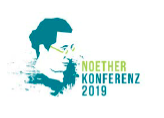Jun 3-5, 2019
How Do New Concepts Emerge? On New Knowledge, Old Patterns of Thought, and Structural Changes
- 09:00 to 17:00
- Symposium
- Dept. Renn
“My methods are really methods of working and thinking. That’s why they have crept in everywhere anonymously.” (Noether 1931)
Interdisciplinary Symposium on the Centenary of Emmy Noether’s Habilitation
Emmy Noether, one of the world’s most influential mathematicians, defined modern algebra with her “methods of working and thinking” and, thus, made significant contributions to the algebraization of mathematics. By developing a  structural perspective on mathematics, she introduced new ways of mathematical investigation. Her habilitation thesis, published in 1918, solved central mathematical problems of general relativity. On June 4, 1919, she defended her habilitation, becoming the first woman in Prussia to complete this step of her scientific career.
structural perspective on mathematics, she introduced new ways of mathematical investigation. Her habilitation thesis, published in 1918, solved central mathematical problems of general relativity. On June 4, 1919, she defended her habilitation, becoming the first woman in Prussia to complete this step of her scientific career.
In celebration of this event, our interdisciplinary symposium asks, “How do new concepts emerge?” It is hosted by the Berlin Mathematics Research Center MATH+, the Max Planck Institute for the History of Science, and the Chief Gender Equality Officer of Freie Universität Berlin. The conference seeks to examine Emmy Noether’s relevance today from the perspectives of various academic fields: mathematics, physics, history of science, and philosophy of science. Furthermore, it considers the mechanisms of discrimination which Emmy Noether faced as a Jewish woman throughout her career in German academia and which continued to affect the posthumous reception of her work.
The conference calls for dialogue transcending disciplinary boundaries. In the spirit of Emmy Noether, it focuses on an openness to new ways of thinking and encourages scrutinizing established academic and societal structures in order to bring innovation into the world.
Location
- Harnack-Haus, Ihnestr. 16-20, 14195 Berlin (June 3)
- Institut für Informatik, Freie Universität Berlin, Takustr. 9, 14195 Berlin (June 4–5)
Contact and Registration
Registration and further information at www.noetherkonferenz2019.de.
Hosts
Berlin Mathematics Research Center MATH+, Max Planck Institute for the History of Science, Chief Gender Equality Officer of Freie Universität Berlin
Main Program
Find the full program on the Noether Conference Website
Accompanying Program
On June 4, 2019, “Mathematical Strolls with Emmy Noether,” a play developed and produced by portraittheater wien in cooperation with Dr. Walter Bauer, Dr. Mechthild Koreuber and Prof. Dr. David Rowe, will premiere. The exhibition “Women of Mathematics throughout Europe”, curated and presented by Prof. Dr. Sylvie Paycha, University of Potsdam, will also accompany the symposium.
Academic Committee
- Dr. Mechthild Koreuber, Freie Universität Berlin
- Prof. Dr. Jürgen Renn, Max Planck Institute for the History of Science
- Prof. Dr. David Rowe, Johannes Gutenberg University Mainz
- Prof. Dr. Christof Schütte, Zuse Institute Berlin
- Prof. Dr. Bettina Wahrig, Technische Universität Braunschweig
Contributions
- Prof. Dr. Andrea Blunck, Universität Hamburg
- Prof. Dr. Christina von Braun, Selma Stern Zentrum für Jüdische Studien Berlin-Brandenburg
- Prof. Dr. Leo Corry, Tel Aviv University
- Prof. Dr. Katja Eilerts, Humboldt-Universität zu Berlin
- Prof. Dr. Catherine Goldstein, Institut de Mathématiques de Jussieu-Paris Rive Gauche
- Prof. Dr.-Ing. Rupert Klein, Freie Universität Berlin
- Dr. Mechthild Koreuber, Freie Universität Berlin
- Prof. Dr. John Maddocks, École Polytechnique Fédérale de Lausanne
- Prof. Dr. Helena Mihaljević, Hochschule für Technik und Wirtschaft Berlin
- Dr. Anina Mischau, Freie Universität Berlin
- Prof. Dr. Dr. h.c. Hermann Nicolai, Max Planck Institute for Gravitational Physics (requested)
- Prof. Dr. Jürgen Renn, Max Planck Institute for the History of Science
- Ana Rojo-Echeburúa, PhD candidate, University of Kent
- Prof. Dr. David Rowe, Johannes Gutenberg University Mainz
- Prof. Dr. Tilman Sauer, Johannes Gutenberg University Mainz
- Dr. Martina R. Schneider, Johannes Gutenberg University Mainz
- Prof. Dr. Reinhard Siegmund-Schultze, University of Agder
- Prof Dr. Mina Teicher, Bar-Ilan University
- Prof. Dr. Caren Tischendorf, Humboldt-Universität zu Berlin
- Dr. Cordula Tollmien, freelance Historian
- Prof. Dr. Anita Traninger, Freie Universität Berlin
- Prof. Dr. Bettina Wahrig, Technische Universität Braunschweig
